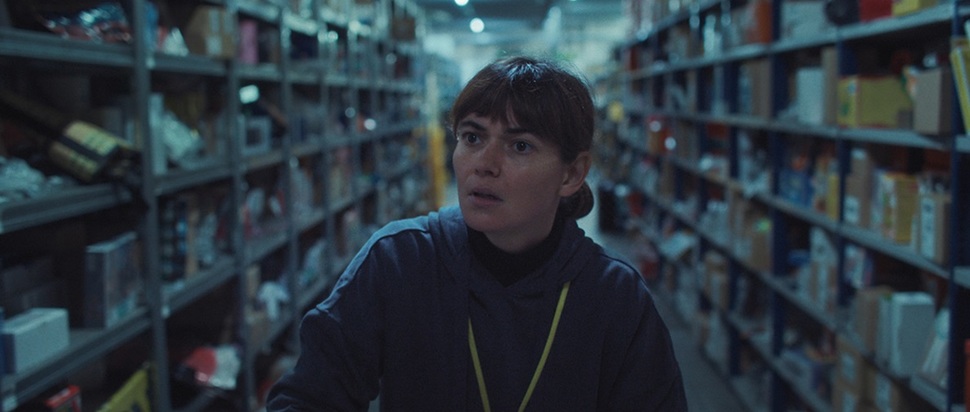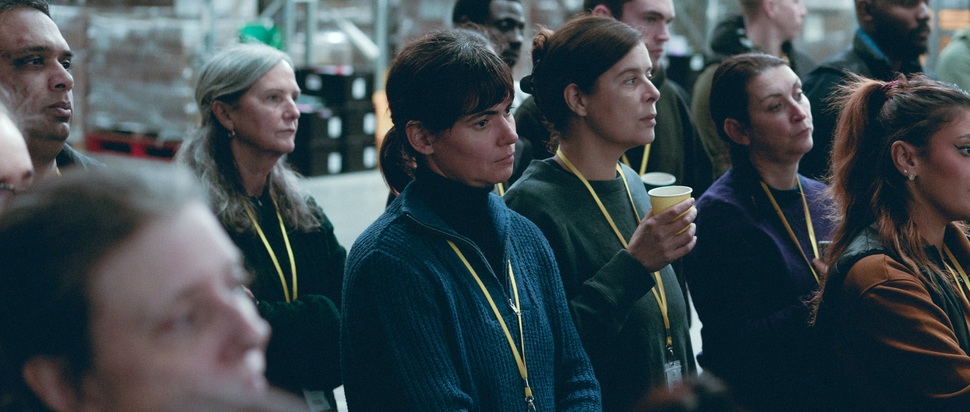Laura Carreira introduces On Falling
On Falling takes us inside the empty life of a picker at an Amazon-like warehouse. Edinburgh-based writer-director Laura Carreira tells us why she wanted to explore the physical, financial and spiritual toll of working within the gig economy
Have you ever noticed how rarely you see people working on screen? It’s something that dawned on Portuguese filmmaker Laura Carreira around the time she arrived in Scotland, aged 18, to begin a course studying film at Edinburgh College of Art. The move coincided with her taking on shift work in the hospitality and care sectors to pay her way. The combination of her studies and her various jobs caused "a kind of crisis" and altered her outlook on life. “I suddenly had this realisation of how much of our lives is defined by work and how little we talk about it,” Carreira recalls.
Work was also absent from the films she was studying in college. “I was seeing so many films where the characters didn't particularly talk about money, and seemed to have so much time to do what they wanted,” says Carreira. “And then I was looking at my own life, which was so defined by shifts and having to request time off with enough time in advance, and working really hard and barely making ends meet.”
At ECA, Carreira’s focus was documentary, and she’d hoped to redress this imbalance by exploring work in a film. Her plan was simply to ask companies if she could bring in her camera to document the shop floor. “I guess maybe I was a little naive,” she admits. “Of course companies weren’t up for that. The dynamics were really off, because I couldn’t be completely honest about what I was doing. I wanted to ask their workers how they felt about their job and I wanted to film them working, but I was never welcomed.”
By the time Carreira realised the documentary would be too compromised, she had finished the course. But after several years of working as an editor, she returned to the idea in a fiction film, her breakthrough short Red Hill. It concerned an ex-miner who now works as a night security guard at his decommissioned pit, and his sense of purpose is about to vanish further with retirement looming. Her urgent follow-up The Shift, about a woman forced to make some tough decisions while out food shopping when she discovers her agency shifts have fallen through, was even more successful in its exploration of the precarity of the gig economy. It helped pave the way for her debut feature, On Falling, a similarly clear-eyed condemnation of modern working conditions. In this case, it concerns Aurora (Joana Santos), a Portuguese woman living in Edinburgh who works as a “picker” in a fulfilment centre, one of those vast facilities that stores, processes, and ships products purchased online.
Carreira discovered the job of the picker – the person responsible for running around these warehouses to select items from storage shelves – when she was researching the precarious agency work for The Shift. “The more I found out about [pickers], the more I realised how interesting a job it is.” One thing Carreira discovered was that the picker role busts any myths we might have about the modern miracle that is online shopping. “We’re told that online shopping is really easy because these companies are using innovation and technology to streamline the process to get these items to our house so quickly,” says Carreira. “But what was really shocking to me was how these pickers are made to rush to get your items; that’s where the speed comes from. So I started to interview pickers and all these different scenes started to build up.”
Cinema is not short of depictions of poverty, but the type of poverty we tend to see on screen is of the most extreme kind: destitution, people living in squalor or on the streets, or who’ve fallen into criminality to survive. Cinema poverty is often so far removed from the average viewer’s life that it feels like science fiction to most. But On Falling is concerned with a different kind of poverty: one that many millions of people in this country face. Aurora works, she has shelter (she lives with several strangers in a private HMO let), and food (hearty and cheap bowls of pasta). But she has no safety net. She’s one unexpected expense – replacing a cracked phone screen, say – away from freefall.

“I was interested in that constant feeling of not being secure,” explains Carreira. “I think that does a lot to your psyche, to your sense of belonging to the community as well when you don’t have entire freedom to live your life in a comfortable way. Statistically, there are so many people in work who have to borrow money to get by or use food banks to survive, and I think that’s incredible when these companies are taking in such huge profits but the people they employ do not make enough to meet the very basics.”
Basics aren’t the only thing Aurora is going without. Carreira’s film draws a sharp line between poverty and the modern epidemic of loneliness. Aurora’s lack of disposable income isolates her. “It was important to me to include that,” says Carreira. “I think it’s well documented how these jobs are really exploitative and tough physically. But I wanted to go a little further and look at what these kinds of jobs do to you almost spiritually as well. The fact you don't have money is not just problematic because you're not getting the basics, it’s also excluding you from society. It’s excluding you from activities that would be as everyday as going out for a drink with a friend. I wanted to look at the bigger picture. What is your life like when you're just working to barely survive?”
A film focused on someone’s repetitive hard work might sound like, well, hard work, but On Falling crackles. The stresses and humiliations that pile upon Aurora are heartbreaking, but Carreira finds darkly funny moments of awkward interaction too, and she has an acute ear for the patronising language that corporations use to placate their workforce. On Falling also keeps you on edge. All the way through there’s a feeling that something terrible is going to happen to Aurora, until it dawns on you that you’re already watching that terrible thing. The daily struggles and exhaustion of working to survive is what creates On Falling’s baked-in tension.
“I didn't plan on creating that suspense,” admits Carreira. “I think it really came naturally from the script, and then obviously Joanna's performance, and just really following what she's going through without her admitting out loud she's experiencing food scarcity; we're only noticing that through the hints of observing what she's eating. So it's almost like these hints are what creates that suspense, and we're allowed to experience this with her to a degree."
On Falling has clearly struck a chord. It’s been winning awards at festivals all across the world, including Best Debut at London Film Festival and Best Director at San Sebastián. It should be required watching for every right-wing pundit or Tory politician who sees poverty as a failure of an individual's moral fibre.
“I think a lot of the times we're told to look kind of within, to fix our financial precarity or fix our mental health," says Carreira. "The blame is often put on the individual. With this film, I was very much trying to frame that struggle within a context. I think it’s valuable if the film introduces that idea of looking at what's around us, and potentially looking for solutions there, instead of blaming the individual first. That, I think, would be a good takeaway.”
On Falling has its Scottish premiere at Glasgow Film Festival on 28 Feb and 1 Mar, and is on general release by CONIC on 7 Mar
